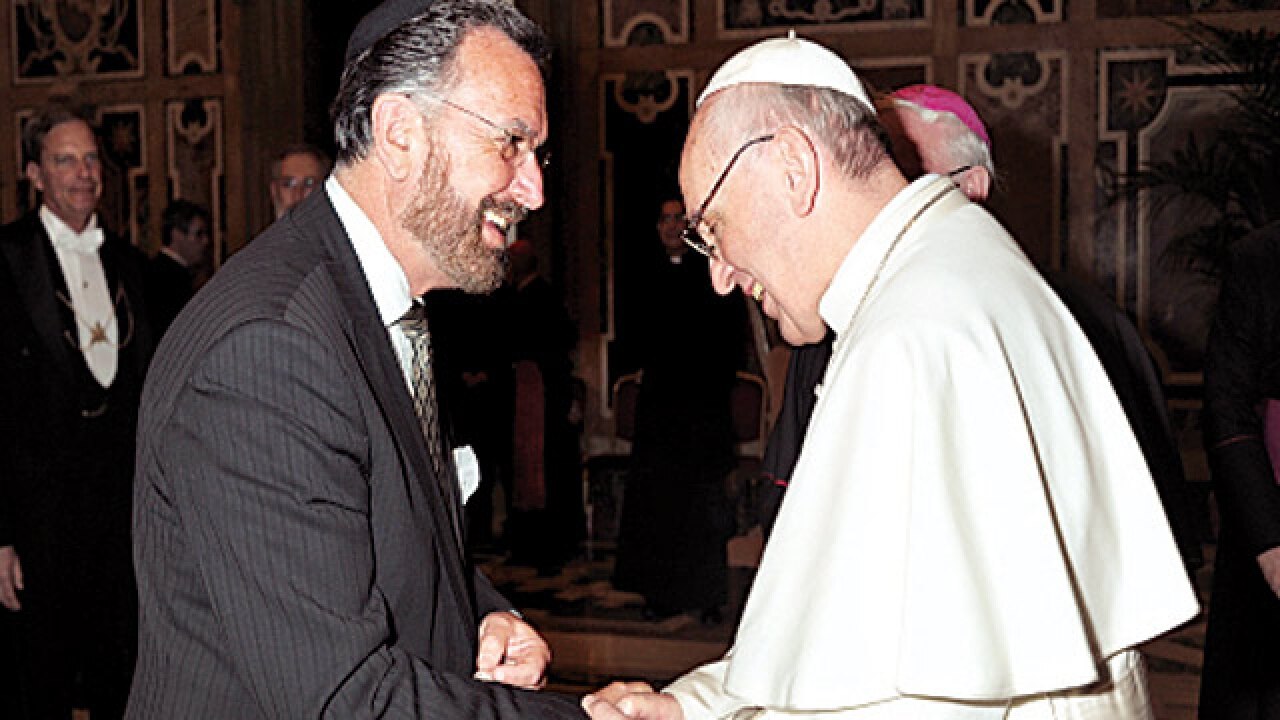
Last time, I remember in 2010, you were bubbling with hope. Middle East was in the process of exploring solutions to its problems. But since then the world has gone topsy-turvy. Is there any glimmer of hope left?
That is a paradox. On the political side, I agree with you, things seem more complex. But on human level a different phenomenon is taking place in the world. There has never been more inter-religious and inter-faith cooperation in human history as it has been today. There are more inter-faith organisations globally. Today divisions are less between religions than within religions. I find myself closer to people of other religions who have an expanded world view than the Rabbis of my own religion who are narrow-minded and insular.
Part of problem is that we are a politicised humanity today. There is a tendency to look everything through the lens of politics. But human life is more than politics.
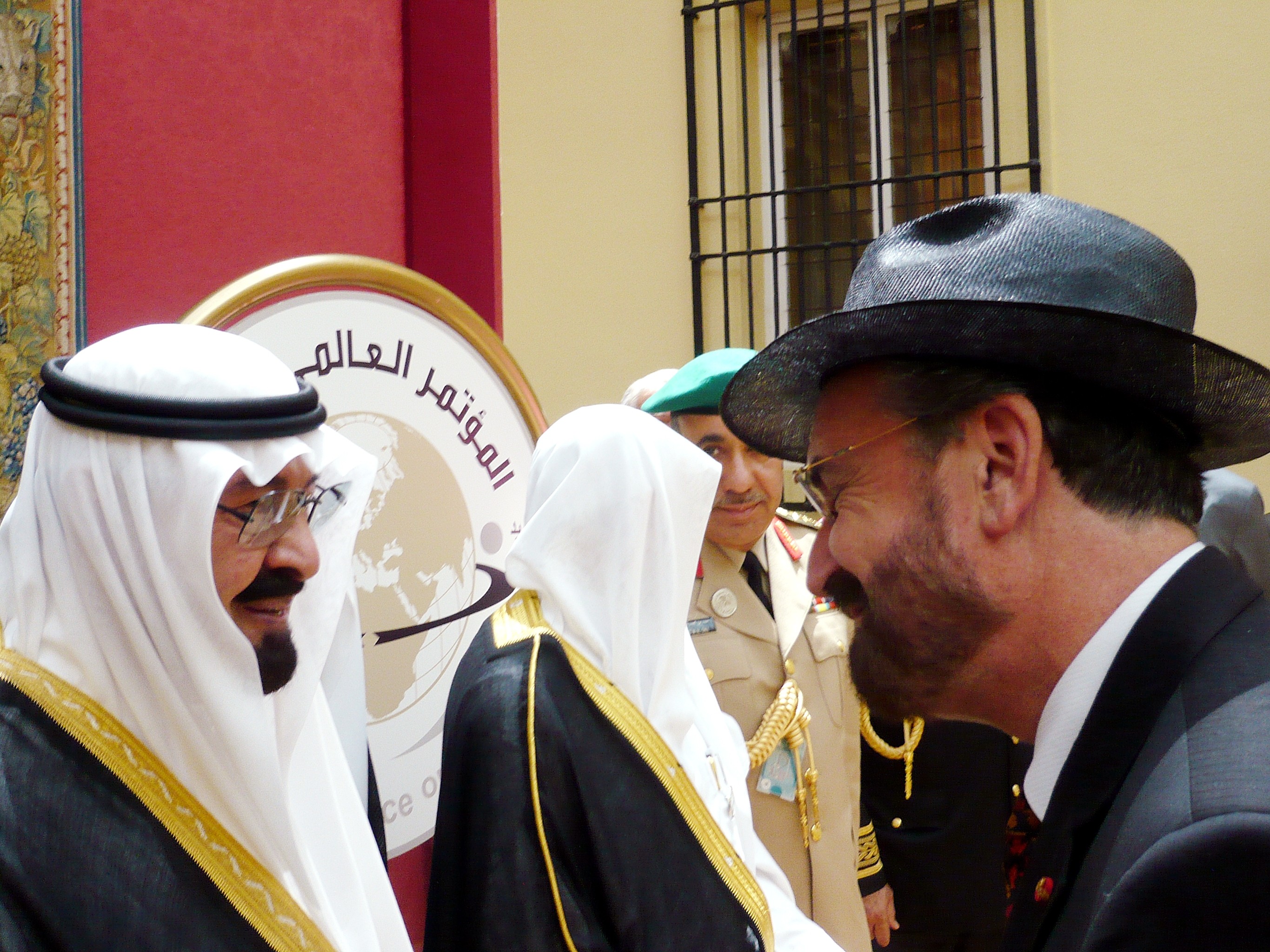
Rabbi David Rosen meets King Abdullah in Madrid, July 2008
How do we move positively in the inter-religious and inter-cultural world to have some kind of impact on political reality?
Some of the things I did explore and I have to be honest, I have been unsuccessful so far. But I keep on trying. You never know, when things change. Going to my part of world, Israelis were more depressed after 1973 war. Our illusions of invincibility had been shattered. Even if we won the war, we felt we had lost it. And ironically and paradoxically, even the Egypt had lost the war, they felt they won it. There was a feeling in Israeli society that we have been let down. But the feeling of vulnerability, existential crises was less after four years when President Saadat had visited Jerusalam and we were beginning a peace process. Even if it was not perfect, it led to peace. It is true that the Middle East is volatile, but things can change very quickly from one direction to other. So it is better to work hard to bring inter-religious and inter-faith commonalities to fore.
When President Obama took over a hope had ignited that the issues in the Middle East will find lasting solutions. But it seems the new president, Donad Trump, is not at all interested in being accommodating.
Even if there are reasons of concerns with new political leadership, I don’t think we are further away from resolution. Paradoxically there might even be new opportunities of collaboration under the present leadership that didn’t exist before. When I look at the Middle East, there is a terrible tragedy in Syria in terms of destruction and death. But in this game, who is the big winner? One of them is Russian President Putin. He has emerged a strong personality in the West and the Middle East, which nobody had ever thought of 10 years ago. Putin needs to be able to find a way to rebuild Syria and looking for more and more alliances with moderate Arab governments. There are potential new constellations that could lead to cooperation and collaboration in our area.
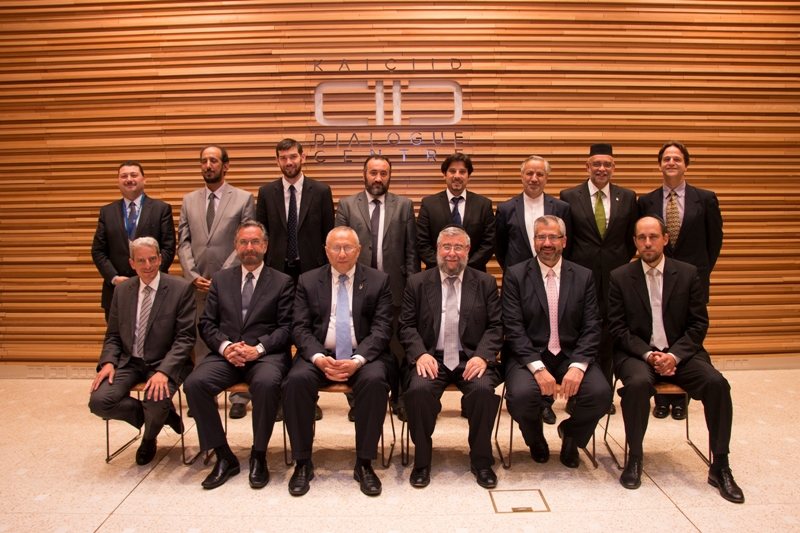
At King Abdullah Bin Abdulaziz International Centre For Interreligious And Intercultural Dialogue (KAICIID), August 2016
Now, there seems to be less support for the two-state formula— that is the states of Israel and Palestine existing side by side.
I don’t think, you are right. When Trump said in his press interaction with (Israeli PM Benjamin) Netanyahu that one-state, two-state whatever they are happy with, (that) was not a forthright response. He was responding with his inimitable style, meaning that it is for the parties to resolve. Netanyahu doesn’t want one-state resolution. That is not in anybody’s interest. One-state at the end means an Arab state and the end of a Jewish state. So nobody really wants that. There is talk, but it is not substantial.
World over extremists and far-right groups have taken centre stage. Isn’t it shrinking space for liberal and moderate voices?
They are taking centre stage because they are getting more visibility in media. Now, why they get visibility is because we who buy newspapers and those who watch television want to see the sensation. If there is no sensation, we prefer to watch soap opera or a movie. Therefore, news needs to focus on the negative, it is understandable. Modern technology now has given us exposure to anything negative in the world.
But I find that there are far more constructive voices in the Muslim world than negative voices. ISIS and Al Qaeda are tiny components of the Muslim world. They get headlines. But the Marrakesh Declaration (2016) at a conference of more than 100 top Islamic scholars that was convened by King of Morocco — declaring the importance of human rights, protection of minorities, their citizenship rights and rejecting Al Qaeda and ISIS, condemned it, calling it a travesty of Islam — got hardly any coverage. I think there are more voices of moderation and responsibility in Muslim world than ever before. Extremism is dominating media visibility and that is a problem. It is not true to say, there is more violence today. There was similar violence 100 years ago. There is more visibility of it now.
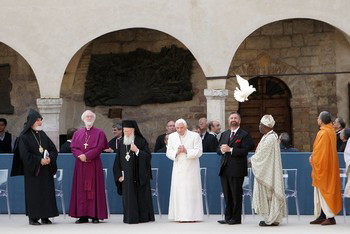
Rabbi David Rosen in Assisi (Italy), October 2011
But these organisations are existential threats to other religions and the ones who differ with them.
Today we only need a few nut cases to do damage that full scale armies did in past. So yes, these groups, which are smaller, relatively speaking , do enormous damage and are existential threats. That is why we have to get together to combat terrorism. But we must not be reactive, but proactive as well. We must attend to drains that breed anopheles mosquitoes of terrorism and that means to attend to marginalisation, economic deprivation, disempowerment, and other such issues. We need to work together more for that. Unfortunately, governments don’t pay much attention to social and psychological needs. There seems exclusive focus on political dimension, which will never put an end to terrorism.
Since you have played an important part in the Middle East peace process, do you see any hope for the renewal of Israeli-Palestinian relations?
On two scores, in terms of cultural and religious fronts, there is lot of communication and cooperation. But what I can say? Cork of the bottle has jammed. It has beautiful fragrance inside but it is in a bottle, people cannot smell it. This cork is the political process. Now the question, is there a hope for political process? I think today there is more hope than ever before. The kind of regional and global issues we are facing, like ISIS and similar other threats, there is a need to attend to this issue. These groups, as I believe, are more a threat to Arab countries than to Israel. It is in the interests of Arab countries to have a regional deal with Israel. That is in the interests of Israel also. I think Gulf states Saudi Arabia, Jordan, Egypt all want to resolve Palestinian issue, which is an irritant for them. It is not that they love Palestinians but this issue is exploited by extremist elements in their countries. That is why they have interest to resolve it. I think, there is a potential scenario for a regional conference and cooperation. First time the US and Russia may come together to find peace.
Before World War II, Christianity and Jews were at each other’s throat. But after the War, the animosity switched over to between Jews and Muslims. Why this paradox?
Wonderful question. Let me intensify it and say Judaism had never had a chronic and bad relation with Islam as it had with Christianity. Islam never delegitimised Jewish existence. For Christianity, once the Jews had rejected Jesus, they were enemies of God and were in league with the Devil and were condemned and therefore there was question for them-- why do Jewish exist? Land rights of Jews were taken away. Temple of Solomon was destroyed, a proof that God had rejected them. Only purpose of their existence was to suffer and be humiliated to prove validity of Christianity. Nothing of that sort existed in Islam. I am not saying every period under Islam was a picnic for Jews. There were power issues, minorities had difficulties, but it was far better under Islam than under Christianity. So my point is, if such a bad relations can be so good today, in which Catholic Church says anti-Semitism is a sin against God and man -- Vatican has diplomatic relations with Israel, where popes come on official visits-- if such a bad relations can be so good, no relationship is beyond the capacity of transformation. After all, we are brothers and disciples of, the sons of Prophet Abraham’s son of Ismail and Ishaq.
I believe if we can resolve the Palestinian issue in a manner where Palestinians feel their dignity has been acknowledged, then psychological problems in Arab world, which see Israel as an affront to their dignity, can be resolved. We can restore healthy foundation to the relationship between Islam and Judaism.
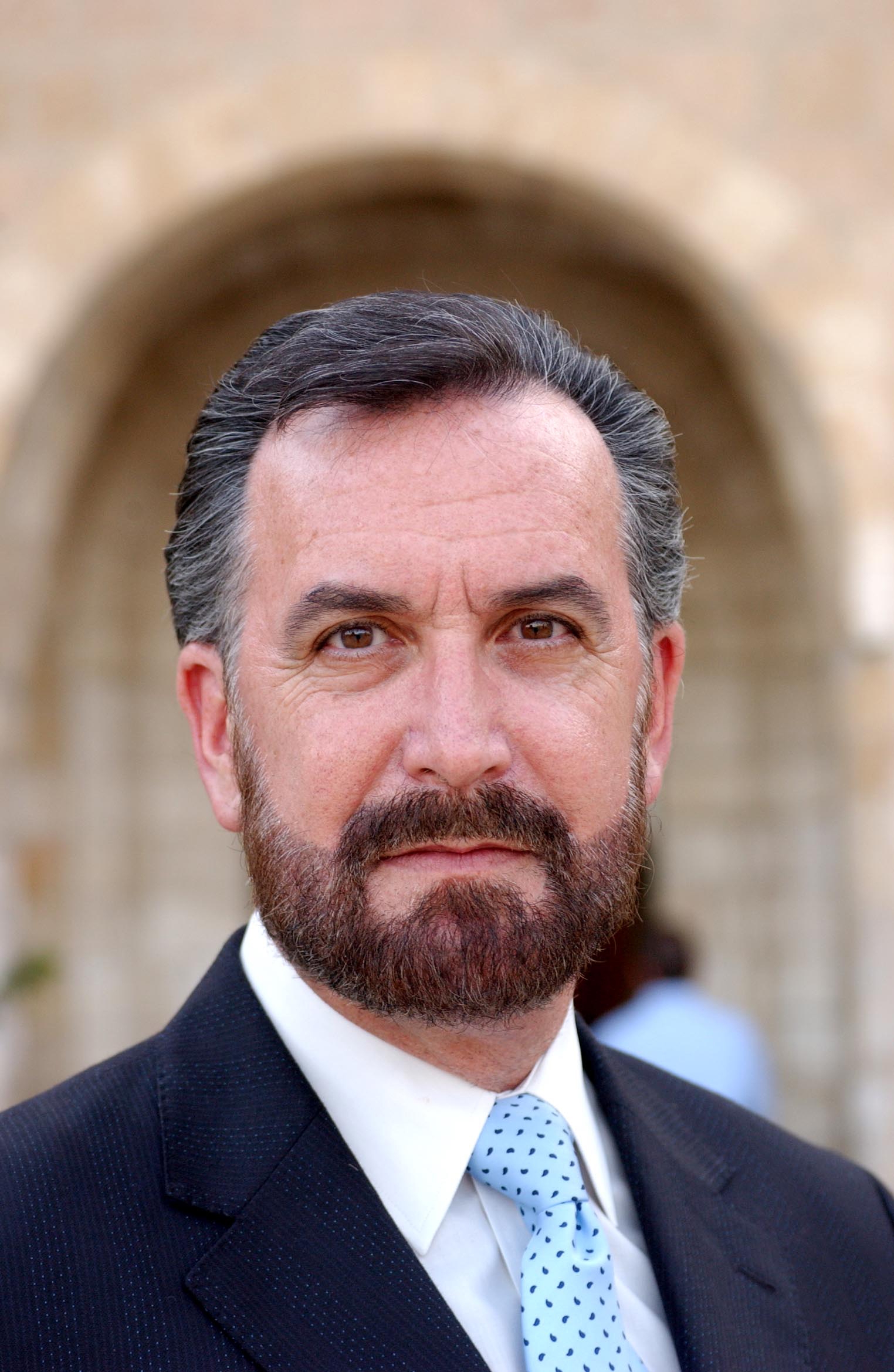
In your discourse, is there any place for Hamas to join peace process?
I am not a political expert. I am Jew and most Jews have strong opinions. I too have strong opinions, even if I am not qualified for that. So I would say a regional peace process is precisely where you can involve Hamas. Then Hamas may not like to sit across table with Israel directly. You can bring these different components in together by encouraging regional negotiations.
Since Jerusalem is as sacred to Muslims and Christians as it is to Jews, why is Israel not allowing them the right to pilgrimage?
I don’t think this right has been taken away. We have Muslims from Nigeria, Indonesia, and Malaysia coming to Jerusalem. But yes, from South Asia we don’t have pilgrims. The issue needs to be brought to the Israeli government. Everybody should have interest to advance Muslim pilgrimage.
South Asian Muslims are not exposed to Jewish civil society, so they have no idea. A great champion of human rights, British MP Gerald Kaffman, was a Jew. In the US, France and many other countries, we have close relations with Muslim communities. We work together. In Israel itself, we have one and half million of Arab Muslim Israelis, people don’t know about them. They are represented in the Parliament.
You have launched an initiative to bring together Imams and Rabbis.
Yes, it was wonderful. But it collapsed for want of finances. I am right now on the board of the King Abdullah centre set up by Saudi, called KAICIID. It is an intergovernmental organisation whose mandate is to promote the use of dialogue globally, to prevent and resolve conflict to enhance understanding and cooperation. On the board of directors are three Muslims-- two Sunni, one Shia-- three Christians -- Vatican, Orthodox and Canterbury-- one Hindu, one Buddhist and one Jew. I represent the Jewish community. King Abdullah invited me. For an Israeli Rabbai to be on the board of his institute is incredible. In this framework, I meet Muslim ulema, whom otherwise, I would never have met.
Quite recently, hate crimes in US are increasing. Besides attacks on Indians, there have been attacks on Jewish cemeteries.
Yes, but Muslims support us there. One Muslim lady arranged funds to rebuild a Jewish cemetery that had been damaged. That is an incredible silver lining. These terrible acts have brought religions together. People of difference need to come together and to oppose those who want to persecute us.